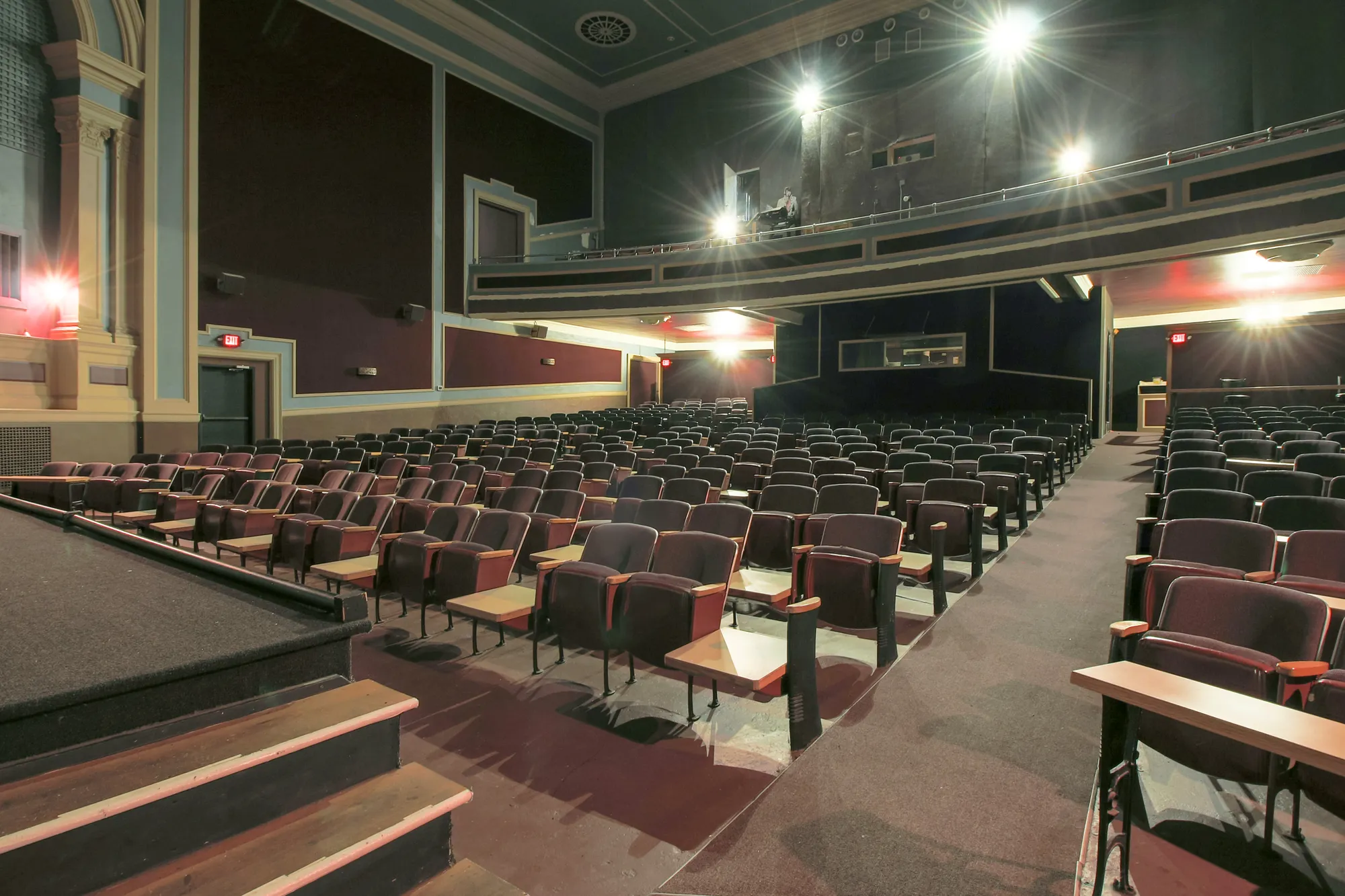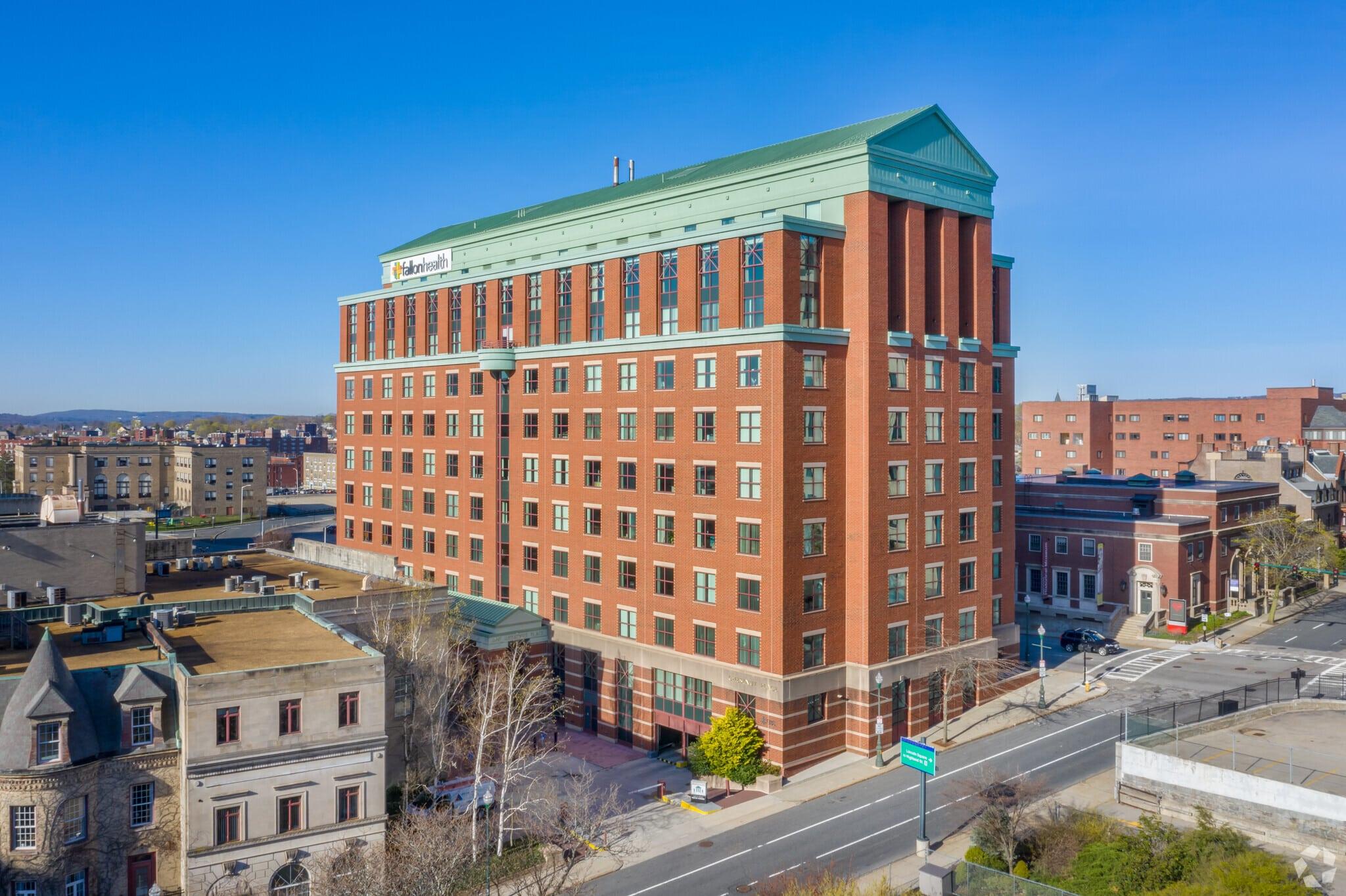Worcester Business Journal
June 2024
Nearly a quarter century ago, Edward Madaus and Paul Demoga, two businessmen, bought the dilapidated former site of the Showcase Cinemas Complex in downtown Worcester.
Originally built in 1904 as the Franklin Square Theatre, the space needed millions of dollars and years of work to be revitalized. But once completed, the space has an undeniable impact on the region’s cultural landscape.
Since its 2008 reopening, The Hanover Theatre & Conservatory for the Performing Arts has racked up accolades, including a National Trust for Historic Preservation Award and a number of listings on the annual Top Theatres in the World list produced by Pollstar, a Los Angeles-based concert venue trade publication. The renovation even inspired a 2023 documentary entitled “On a Wing and a Prayer: Achieving the Impossible Dream.”
Despite the success of the Hanover, attempts to reopen other dormant theater spaces since 2008 in Central Massachusetts have shown how difficult it is to turn these types of dreams into reality.
Some of these venues, like the Olympia Theatre in Worcester, date back to the late 19th century, offering a chance to bring unique architectural marvels back to life. Others, like the former Foothills Theatre a few blocks away, could provide the last piece of the puzzle in creating a modern dining and entertainment center.
Bringing older live performance spaces back to life could bolster the Central Massachusetts entertainment scene. For other venues to follow the Hanover Theatre’s path, serious commitment will be needed, both financial and otherwise.
Waiting on a Friend
Perhaps the most prominent example of a derelict live entertainment space in Central Massachusetts is the 3,500-seat Worcester Memorial Auditorium. Looming over Lincoln Square, the auditorium was constructed in 1933 and hosted a wide variety of sports, music, and theater events, including basketball games and performances by artists like Bob Dylan and The Rolling Stones.
Long past its heyday, the space has been mostly vacant since the early 2000s. The Boston-based Architectural Heritage Foundation has reached a land disposition agreement with the City of Worcester involving the site, with the ultimate goal of bringing it back to life as a venue focused on emerging events such as e-sports, robotics competitions, and immersive exhibits.
“It’s a really good partnership, because we don’t have to take ownership at this point, until we can find a viable reuse and financial plan,” said Jake Sanders, project executive at AHM.
The cost of renovations would be substantial, requiring significant contributions from public subsidies and/or private donations, Sanders said. AHF reopening the unique structure would likely surpass the renovation of the Hanover Theatre in both cost and scale.
Changing Entertainment Landscape
Live performance theater projects that are significantly less ambitious than the attempt to revitalize WMA still face a number of challenges, including difficulties in raising financing for construction projects and the uncertain state of the theater industry.
Even before the COVID-19 pandemic led to the shuttering of theater productions across the country, the sector was struggling with a number of challenges, according to a February report from Barbara Fuchs and Rhonda Sharrah, two professors at UCLA.
Their report found theater subscriptions, a business model allowing venues to bank box office proceeds and be less reliant on individual ticket sales, were in decline before the pandemic, as nonprofit theaters only covered 50% of costs with ticket sales, the rest being made up with public funds or philanthropy.
Since the pandemic, live entertainment’s recovery has been a bit of a mixed bag. Attendance to Broadway shows is down 17% when comparing 2024 to 2020, according to a New York Times article from March. Concert ticket sales are up for the world’s biggest acts and venues, but smaller players are struggling with skyrocketing costs.
Beyond changing consumer trends in the live performance industry, the three-headed monster of rising labor costs, increasing construction expenses, and the diminished availability of capital impacting development projects of all types threatens to hinder potential theater revitalization efforts as well.

Foothills and Strand
One way to insulate these venues from the recent struggles of the theater industry is to diversify their potential uses. Figures involved in efforts to reoccupy the Strand Theatre in Clinton and the former Foothills Theatre in Worcester, now dubbed the Mercantile Entertainment Center, feel the best path forward for these venues is for them to be multi-use spaces.
First constructed in 1923, the Strand was originally used for cinema and vaudeville entertainment, according to a 2022 feasibility study published by the Town of Clinton. In 1995, it was converted into a cinema draft house, offering patrons the chance to see second-run films in an architectural atmosphere with more character than the average movie cinema chain.
The Strand was hit hard by the pandemic, and the final movie night was held on Dec. 31, 2021. Since then, Clinton has been trying to bring new life into this historic structure sitting in the middle of downtown.
“The Strand is important to the community in a number of ways,” said Phil Duffy, director of community and economic development for Clinton. “Not many towns can say they have a still essentially intact 1920s vertical theater that, up until COVID, was in daily operation.”
Unique architectural features still extant at the Strand include its original theatrical rigging system, orchestra pit, and dressing rooms, according to the feasibility report. A number of interested parties have undergone walkthroughs of the facility, Duffy said, but the search for the right tenant continues.
Compared to the Strand, the Mercantile Entertainment Center is a youngster. First opened in 1987, the 349-seat venue closed in 2009, sitting idle since.
Todd Alexander, executive vice president at Worcester-based Kelleher & Sadowsky Associates, has been tasked with finding a lease tenant for the site. He feels the right tenant could help turn Mercantile Center into a true dining and entertainment destination.
“We’ve had a lot of interest from various groups,” Alexander said. “Construction costs being as high as they are right now is our biggest hurdle as far as leasing the space.”
Despite challenges, both venues have some positives. The former Foothills will likely need some upgrades and repairs, said Alexander, but seating and other features remain intact and in relatively good condition.
The 101-year-old Strand has certainly seen better days, but it has one thing going for it: Available financial assistance for potential developers. In total, $400,000 is available in matching public funds, which can be put toward upgrading the space, said Duffy.
Olympia
If finding new tenants for the MEC and Strand is a challenge, revitalizing the Olympia Theatre in Worcester may take a Shakespearean-level of creative thinking.
Sitting less than a half-mile away from the former Foothill and the current Hanover, the 133-year-old, 25,000-square-foot venue, which once sat around a 1,000 patrons, sits tucked away behind a massive brick facade on Pleasant Street.
Like a well-seasoned actor, the Olympia has played many roles over its 13 decades of existence. Originally opened as an opera house, the theater has been the site of dramas, vaudeville acts, and later a movie theater, according to CinemaTreasures.org, a website chronicling the history of the nation’s theaters. It features ornate architecture unlikely to be found in modern theaters, including the use of Roman brick and a mosaic title entrance.
The Olympia spent some of its final act as an adult film theater before being shuttered in 2006.
In September 2021, Addison, Kyle, and Tammy Kahale purchased the building for $527,400, later launching the Worcester Olympia Theatre Foundation, a nonprofit with the mission of bringing the theater back from the dead. A website was launched to display renderings of what a rejuvenated Olympia might look like and to solicit donations.
Since the initial excitement surrounding the potential revitalization of the Olympia three years ago, the foundation is still trying to finalize a fundraising gameplan and figure out the next steps in the long road to reopening, said Addison Kahale.
“We’re working on smaller [aspects], but there’s some waiting in getting stuff done,” he said. “You make a phone call, and then you wait to hear back.”
Like Duffy and Alexander, Kahale sees a reopened Olympia as a venue for multiple forms of entertainment. He sees stand-up comedy and movie screenings as two possibilities, noting the lack of a movie theater within Worcester.
Getting the Olympia back open will cost millions, Kahale estimated.
The Heart of Fitchburg
Fitchburg State University is leading an effort to revive a theater complex on the city’s Main Street that has been dormant since 1987.
Since first acquired by FSU in 2016, plans for the space have undergone several iterations.
Part of the space has been turned into a video game design lab. The next stage of plans call for a black box theater to be built within the footprint of the old theater, according to a statement issued to WBJ by the university.
The school was unable to provide a timeline on completion of the project, but said the redevelopment, which has benefited from state and federal funding, is already having an impact.
“Entrepreneurs and developers have cited the university’s theater plans as a valuable complement to their own ambitions for the heart of the city,” the statement read.
Where Culture Can Happen
The Hanover Theater restoration didn’t happen overnight. In the end, it took eight years and $32 million.
Newer projects, particular ones as ambitious as the Olympia, may take a similar amount of funds and time.
Timeframe and costs will vary depending on the space, but unique architectural spaces like the Strand offer unique benefits, said Duffy.
“It’s a great amenity,” he said. “It supports a quality of life that is unique. To be able to just walk down the street or drive around the block and take in a show or a movie is a treat. We see the Strand as a place where culture can happen, and we see it as a financial engine of opportunity for adjacent businesses.”
By Eric Casey



